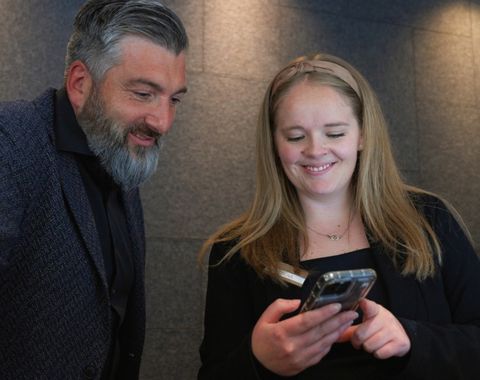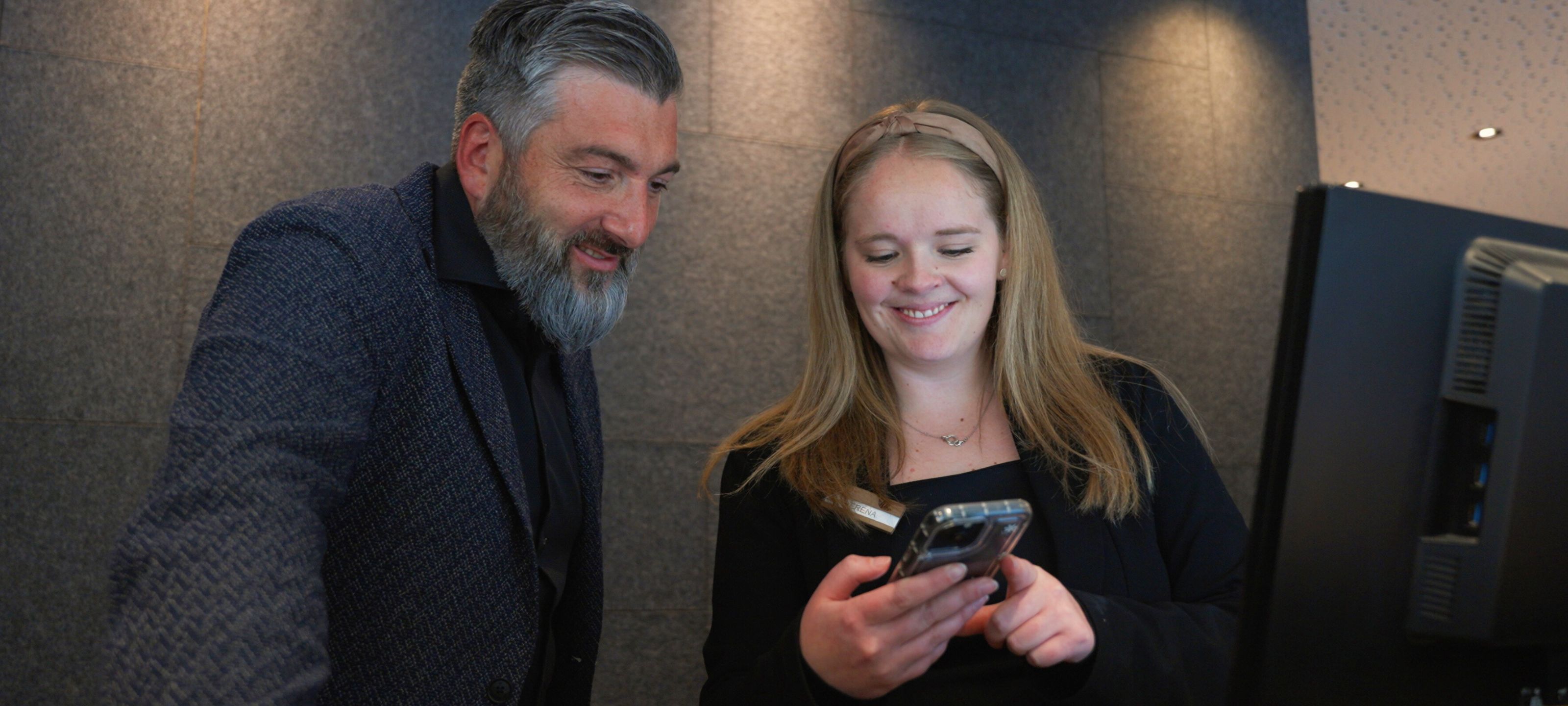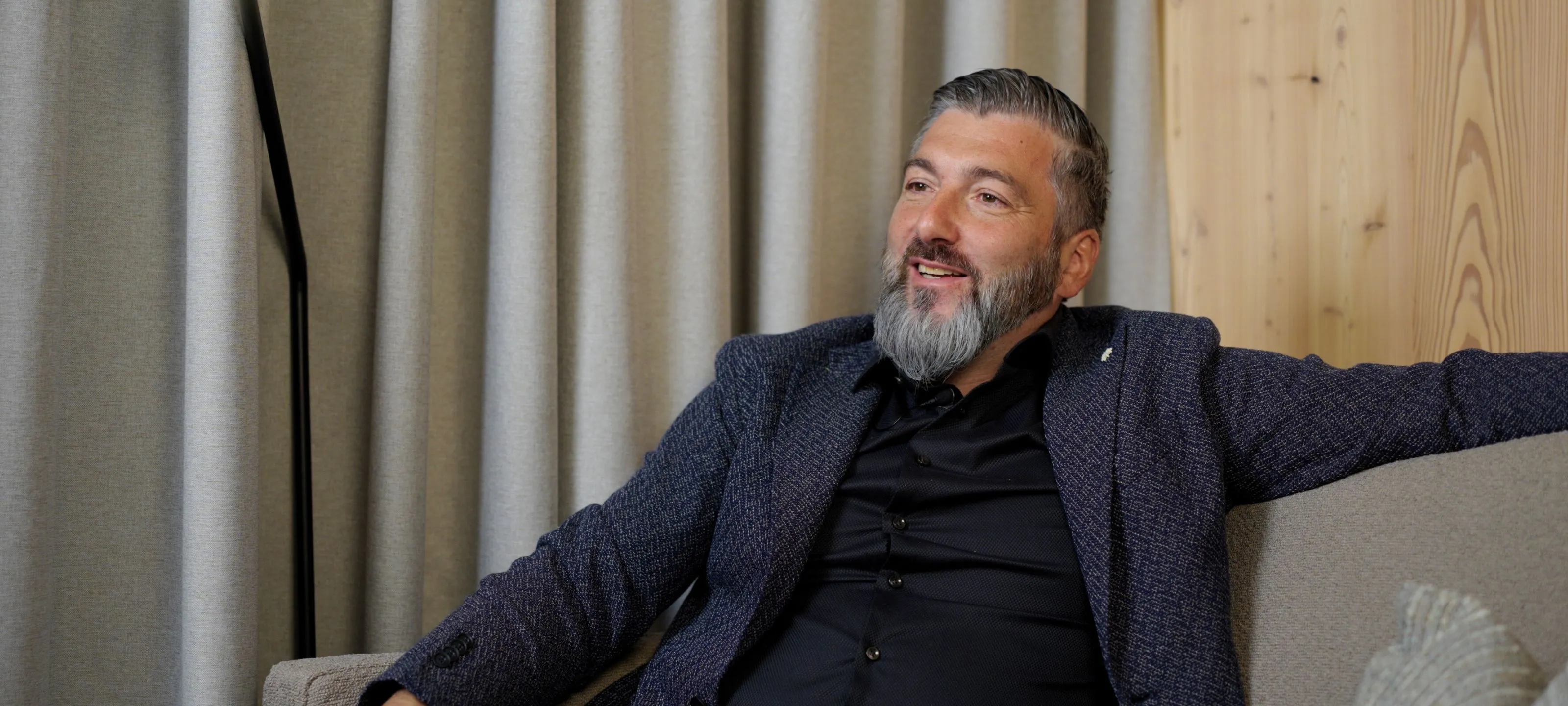
In Conversation with Ralph A. Riffeser, Cavallino Bianco family spa Grand Hotel

Ralph A. Riffeser, host of the Cavallino Bianco Family Spa Grand Hotel, reveals in an interview how he turned the hotel into a worldwide benchmark for family vacations. Discover his secrets to success and the strategy behind a unique guest concept.
.webp)
The Visionary Behind the Success
Ralph A. Riffeser is the CEO of the Cavallino Bianco family spa grand hotel in Ortisei/South Tyrol, which in 2018 was named "World's Best Family Hotel" by Tripadvisor for the sixth consecutive year (Traveller's Choice Award).In an interview with Joachim Leiter, Executive and Head of Marketing and Sales at ADDITIVE, Riffeser talks about (hotel) brands, the challenges of digitalization in a family hotel and Cavallino Bianco as a "relationship hotel for families". About himself, Riffeser says: "Basically, I don't have a job, I have a hobby.
<div class="article_quote"><div class="article_quote_contain"><div class="article_quote_quote">"Our guests are our influencers!"</div><div class="article_quote_name u-text-style-main">Ralph A. Riffeser</div></div></div>
<h3 class="interview-question">Mr. Riffeser, please complete this sentence: The Cavallino Bianco is...</h3>
... the sum of characteristics such as madness, courage and the stubbornness to go one's own way. And this madness is not easy to copy. Do you know any other hotelier who allows himself to be so crazy?
<h3 class="interview-question">Was it always your ambition to become a hotelier?</h3>
No, I originally wanted to be a business lawyer. Then, after a summer job in my grandfather's hotel, my passion for the profession was ignited and I finally joined as general manager in 1993. I have no academic background, I work on pure instinct combined with a lot of failures from which I learn. But that is what makes my job so exciting.
<h3 class="interview-question">Cavallino Bianco is a strong brand and is often associated with being the world champion of family hotels. Is there a classical brand management for the hotel?</h3>In fact, it is very subjective, very personal. In fact, Cavallino Bianco, or the vision of Cavallino Bianco, is the movie version of my life: it's about relationships, entrepreneurship, difficulties in relationships (both as a partner and as a parent) and the factor of time or time commitment. I know from experience what families need on vacation and I have tried to build the house around these necessities. Cavallino Bianco is a relationship center for families disguised as a hotel.

The Cavallino Bianco: A Paradise for Families
<h3 class="interview-question">This brings us to the heart of the corporate vision. Could you tell us more about that?</h3>
A few years ago, I was introduced to the principle of the "Golden Circle" by management consultant Simon Sinek, and it's about the questions that successful companies use to communicate: "Why?", "How?", or "What?". Normally, people strive for the "What? What do I want to achieve? For me, success or happiness is only the result, the consequence, but never the goal. I strive and strive for the "Why?", the "Why?": The couple's happiness and well-being as parents, that's what it's all about. More than 20 years ago, with Cavallino Bianco, I wanted to create a place that would be a kind of gravity for this. From the original formula of "honeymoon with child", through the constant confrontation with my guests, a Grand Hotel exclusively for families with 150 employees was born. Sometimes I don't even think of myself as a hotel anymore, but rather as a relationship center for families... (grins).
<h3 class="interview-question">What do you associate with the term "marketing" in the hotel industry, and what is the concrete implementation of successful marketing?</h3>
I equate marketing with empathy. If you develop empathy for your market and your customers, and you succeed in translating that into a product, then you can say "bingo". Empathy must go so far as to understand what the guest is not saying. In other words, you have to recognize and exploit the hidden needs of the guest. That's the secret, that's what we're good at here at Cavallino Bianco. This only works if you are close to the guest and spend time with him.
<h3 class="interview-question">Is the topic "product development" a matter for the boss?</h3>
Not exclusively, I would say. I allow myself to be the craziest of all and live accordingly. But all of my employees are required to not only provide their own service, but also to constantly walk through the house with active reception sensors and register what signals the guest is sending. Especially those that are not explicitly expressed.
<h3 class="interview-question">Constant product development as a corporate culture, so to speak: is that the big advantage over other companies?</h3>It is. Listening to our guests and taking their suggestions and wishes seriously is our source of inspiration. That's why I'm increasingly encouraging our employees to mingle with guests. This creates a relationship with the guest and gives them important impulses that they can put into practice. In this way, we are constantly evolving and leaving no stone unturned.
.webp)
Innovations That Make a Difference
<h3 class="interview-question">On the topic of digitalization: Which digital innovations have had the greatest impact on your business, and where do you see problems?</h3>
Email has certainly brought the most benefits as a new communication channel. But now you are online all the time, with all the advantages and disadvantages: Like an embryo that can't survive without an umbilical cord, you live with the extreme pressure of always being connected. At the same time, constant accessibility means no real time for regeneration, it can become a plague.
<div class="article_quote"><div class="article_quote_contain"><div class="article_quote_quote">"Against all advice: I never respond to reviews, positive or negative."</div><div class="article_quote_name u-text-style-main">Ralph A. Riffeser</div></div></div>
<h3 class="interview-question">How have digital revolutions such as social media or review sites affected you?</h3>
Both have had a big impact, especially reputation management and review sites. I remember the early days, first holidaycheck.de, then TripAdvisor, a lot of guests really went crazy there. We based our marketing strategy less on how we wanted to communicate and more on trying to optimize our product so that customers would talk positively about it. This word-of-mouth was originally more unconscious, but today we are more intentional about it. Basically, if guests leave the hotel happy and talk positively about their vacation in their environment, they will do the same on the review sites. If you look at the reviews, you can see what the guest is feeling: it's real and honest. And contrary to any advice: I never respond to reviews, positive or negative. I don't want to influence opinions by making guests think, "Oh, Ralph's looking at this," and feel limited in their opinions. I prefer to influence it here in the hotel!
<h3 class="interview-question">Do you have guest satisfaction management or an automated solution?</h3>
No, we have questionnaires that are emailed to the guest after their stay. We evaluate them and analyze them together with our department managers to find concrete solutions for any problems. I think we're very good at managing online reputation because we don't react online, we react on the spot. In this way, the positive reputation is a pure consequence: the guest leaves satisfied and is happy to tell others.
<h3 class="interview-question">What does digitalization mean for a family hotel? How do you manage to reconcile both worlds?</h3>
At the moment, our priority is to give digitalization the right space. This is relatively modest; on the one hand, we are trying to counteract the issue for the benefit of the guests. For example, in the communal dining area: Cell phones or tablets are now present at the table like an additional family member. The question was how to counteract this. Our playful solution: a huge bunch of balloons at the entrance of the restaurant. The kids get one on the condition that all the utensils disappear from the table. The balloon is then attached to a small wooden block in the middle of the table, with the motto "We are a family and we like to talk". But: On the other hand, we have an intranet solution with all hotel information and programs: Digitization in the sense of sustainability.
<h3 class="interview-question">A hotel of your size generates a lot of guest data. How do you deal with it?</h3>
We have a lot of data, but it is still very unstructured and scattered in the different departments: the chef has his information, the children's area, the nanny, etc..... We are in the process of setting up a CRM system to capture this information. However, it is not so much the evaluation that is important, but the clean recording: the information must be stored immediately and in the right place.
<h3 class="interview-question">So data quality is definitely an issue?</h3>
Absolutely, also in order to be able to surprise our guests with little things and attentions that we "remember". Guests are especially impressed when they and their children are immediately addressed by name. Unfortunately, I don't have this special gift of remembering faces and names, but fortunately some of my staff do. In the medium term, we are aiming for a digital solution in this area.
<div class="article_quote"><div class="article_quote_contain"><div class="article_quote_quote">"The potential of small hotels as opposed to huge, soulless hotel castles lies in their proximity to the guest."</div><div class="article_quote_name u-text-style-main">Ralph A. Riffeser</div></div></div>
<h3 class="interview-question">With 150 employees in 104 rooms, you have one of the highest staff densities in South Tyrol. Why is that?</h3>
I see an absolute mania for self-promotion; everyone wants their 15 minutes of fame. Look at platforms like Instagram. At Cavallino Bianco, we try to give our guests the stage they need in person and in real life. We give them attention. This only works with a large number of people who can devote a certain amount of time to each person. By the way, this is also the potential of small hotels as opposed to huge, soulless hotel castles: the closeness to the guest.
<h3 class="interview-question">How many people do you employ in the Marketing / Online Marketing & Communications department?</h3>
Our Marketing, Communications and Events department is made up of four people who not only deal with marketing in the traditional sense, but also coordinate all of Cavallino Bianco's events.
<h3 class="interview-question">What is your position on online distribution channels?</h3>We're not on any OTAs, we rely on direct advice: it's basically like shopping in a boutique or on Zalando. In a boutique, I'm happy to pay 50 euros more for competent advice from a salesperson who listens to my needs. Initially, there was a technical problem with booking.com because our price list was not compatible with their system. But as time went on, I realized that with OTAs we risked losing our identity. Again, Cavallino Bianco is going its own way. With an independent, strong brand, you are immune to the pull of these distribution channels. Maybe we are so regressive that we are ahead of the times again.

<h3 class="interview-question">Speaking of trends: One of the current trends in online marketing is influencer marketing. Does this type of marketing play a role for Cavallino Bianco?</h3>
I think Cavallino Bianco's influencers are our guests. We really have a lot of VIPs from different fields here, but I don't brag about these people. For me, they are regular guests who pay the same room rates, maybe they get two more "hellos". Privacy is paramount here, even celebrities want peace and quiet when they are on vacation. But as the spirit of the times demands, we also monitor online trends and develop our strategies accordingly.
<h3 class="interview-question">Cavallino Bianco is increasingly working with regular customers. In your hotel, the life cycle of a regular guest lasts until the children grow up, which is a long time at up to 20 years. Is there a continuous communication with this special group of guests?</h3>
I don't see the need for intrusive communication. In principle, regular guests are not targeted once they are back home. Nor do they receive a booking reminder. We are either being negligent or ahead of the curve. It is difficult to say which approach is right or wrong. If a guest wants to vacation with us, he will book, he does not need my motivation or manipulation. One thing I can guarantee is that what we promise our guests is what they will find here.
<h3 class="interview-question">Do you have a loyalty system?</h3>
There is no loyalty discount, I am not buying a guest! Sure, there are early bird discounts and the like, and we invite regular guests to an exclusive hike. Again, we try to keep the "manipulation" as low as possible. Regarding revenue management or price adjustments based on occupancy, we set prices once a year, which I think is a promise of transparency. Why should someone get a better price because they were smarter in their booking or because they found a particular site that needed revenue or occupancy? Have you ever asked for a discount at the Apple Store? Exactly. Nobody buys products that are low priced. Price is part of the product, I'd even say it's a quality feature. I also think, for example, that the star classification is outdated: in my opinion, this classification should be broken down to the price in South Tyrol, which would be a more accurate hotel category. If a hotelier charges 1000€ per night and gets this price to keep his business alive, that is his category. If this hotel has 7 swimming pools or none, it does not matter, the price decides. The guest is now so selective that he knows if it is worth the money. The price is a fixed part of a hotel and that is why we always communicate the price in advance.
<div class="article_quote"><div class="article_quote_contain"><div class="article_quote_quote">"The goal is not the price or the turnover, but satisfied guests."</div><div class="article_quote_name u-text-style-main">Ralph A. Riffeser</div></div></div>
<h3 class="interview-question">The price presentation at Cavallino is very reduced...</h3>Exactly, about three years ago we introduced room prices instead of the usual person prices. We have also been thinking about uniform prices for a long time, but it makes a difference if you come to Val Gardena during the ski season or during the warmer summer season or in November when the lifts are closed. The prices can't be standardized. But again, the goal is not the price or the turnover, but the satisfied guest. With the right price, the turnover comes automatically.
A Look into the Future: What’s Next?
<h3 class="interview-question">Where do you see yourself personally and as an entrepreneur in 2025?</h3>
I hope that I will still be able to bring groups of guests to the hotel that are suitable for each other and for the hotel. I also hope that we, as a hotel, live up to the expectations we have created for ourselves. Our promise is growing, our service is growing, the demands are growing: we have to be able to meet and even exceed them.On a personal note, I hope to continue to enjoy my work, I am a passionate entrepreneur. Cavallino Bianco is my hobby, which finances my other hobbies (grins). On a personal level, I want my children to be happy, to stand on their own two feet and to find fulfillment in their careers.
<h3 class="interview-question">What ambitious project will you complete by 2025?</h3>Although times are not easy, I confess: "I am a dreamer who has the courage to take the risk to live and realize his dreams (Paolo Coelho, writer)". One of the concrete projects is a hotel for single parents with children in Sirmione on Lake Garda, which is currently struggling against the mills of politics and bureaucracy.
<h3 class="interview-question">Is there a personality in tourism or in any other field that you have always wanted to meet and why?</h3>
Some... (thinking). Basically, I am impressed and inspired by people who have the courage to do their own thing. To exaggerate, those who have a slight tendency towards madness. The first person that comes to mind is Steve Jobs. A perfectionist with what should have been a simple idea: a one-button cell phone. Or Elon Musk, although with his mathematical background he is a bit too academic for me. I would love to talk to these personalities, maybe because I am a similar "maniac" in a positive sense...
Thank you very much for the interview!







.jpg)

.jpg)



.webp)
